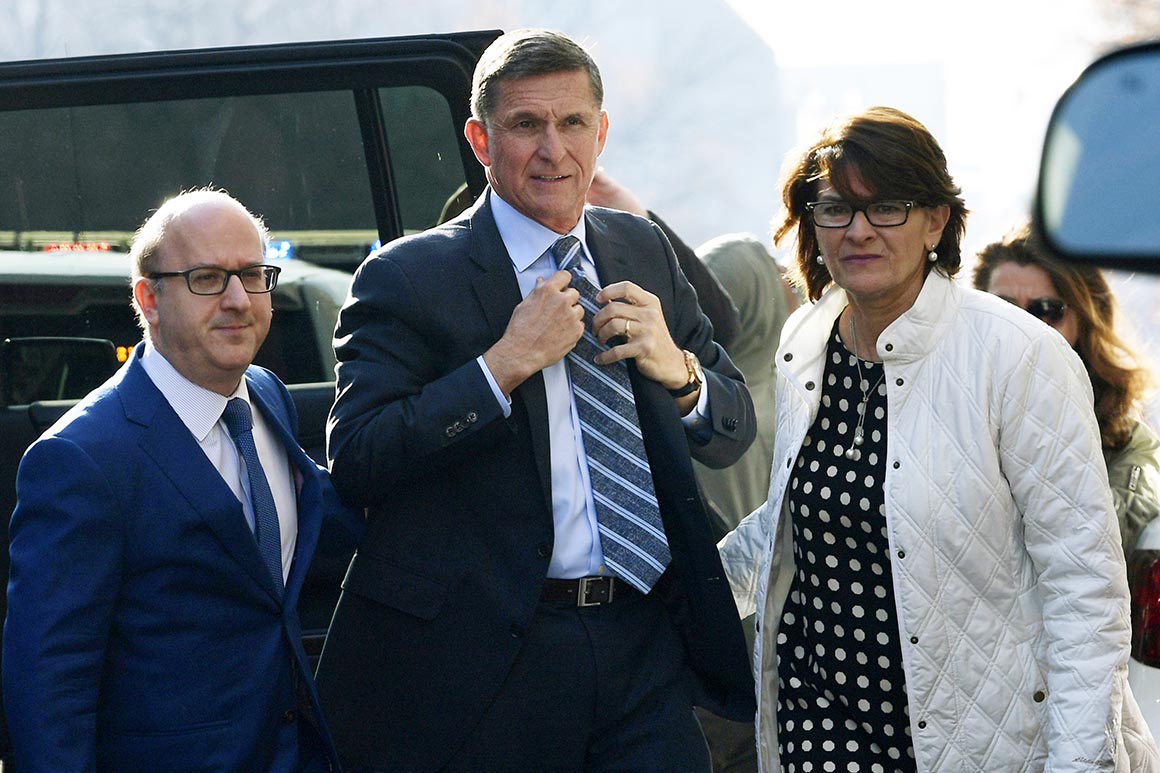
But messages later that afternoon between senior agents and FBI officials show a last-minute reversal, driven by discussions at the bureau’s highest levels.
“Hey, don’t close RAZOR,” FBI counterintelligence agent Peter Strzok wrote to an agent whose name is redacted but is identified in the conversation as the official case agent. He adds, “7th floor involved,” a reference to the highest echelons of FBI leadership.
The partly redacted messages don’t indicate why the reversal occurred — it came just 20 minutes after the document to close the case had been circulating and less than a week after Flynn spoke by phone to a top Russian diplomat.
Flynn eventually pleaded guilty to a count of lying to the FBI about his conversations with the Russian diplomat, which occurred during the transition between President Donald Trump’s election win and his inauguration.
Flynn then cooperated for months with special counsel Robert Mueller’s investigation of the Trump campaign’s contacts with Russians. But Flynn moved to withdraw his guilty plea last year, accusing the FBI of “egregious misconduct” and earning support from top allies in Trump’s orbit, as well as Trump himself.
Trump on Thursday raged about the new documents — which revealed the FBI’s internal deliberations about managing the sensitive investigation — arguing they exposed the bureau’s unfair treatment of Flynn.
“Look at what they did to the guy,” Trump told reporters in the Oval Office. “What they did to this man, they tormented him.”
More specifically, Flynn’s allies said the new filings offer more evidence that the FBI concocted its case against Flynn, seeking to pin him with a crime to further the ongoing investigation of Russian interference in the 2016 election. That the agent who ordered the case to remain open was Strzok — whose anti-Trump text messages in 2016 led to accusations by Trump and his allies of “coup” against his presidency — only fueled their fury.
The document intended to close the case was labeled a “draft” and indicated that the matter could be reopened if new evidence came to light. It’s unclear when the FBI learned that Flynn’s calls with Russia’s then-ambassador to the United States, Sergey Kislyak, had been intercepted. The FBI interviewed Flynn about those calls in late January 2017, just days after Trump took office and Flynn became his national security adviser. Trump fired Flynn weeks later for lying to Vice President Mike Pence about his calls with Kislyak.
On Thursday, Pence indicated that he’s less certain that Flynn lied to him than he had been before.
“I know what Gen. Flynn told me and I’m more inclined to believe it was unintentional than ever before,” he told reporters on Thursday, while traveling. Pence deferred to Trump when asked about the prospect of a Flynn pardon.
Flynn allies also pointed to evidence released Wednesday that the FBI deliberated about its approach to Flynn’s interview and whether to confront him with its knowledge of the Kislyak calls if they caught him lying.
Notes from one senior FBI official, believed to be former counterintelligence chief Bill Priestap, indicate that agents had discussions about whether the goal of the interview was to “get him to lie so we can prosecute him or get him fired.” Though the official noted he leaned against that approach, it’s unclear what further deliberations occurred and how the final call was made.
The documents released Thursday reveal more internal machinations at the FBI unearthed during a review ordered by Attorney General William Barr, who tasked the U.S. attorney from the Eastern District of Missouri to lead the effort.
Josh Gerstein, Natasha Bertrand and Betsy Woodruff Swan contributed to this report.
Source: politico.com
See more here: news365.stream






